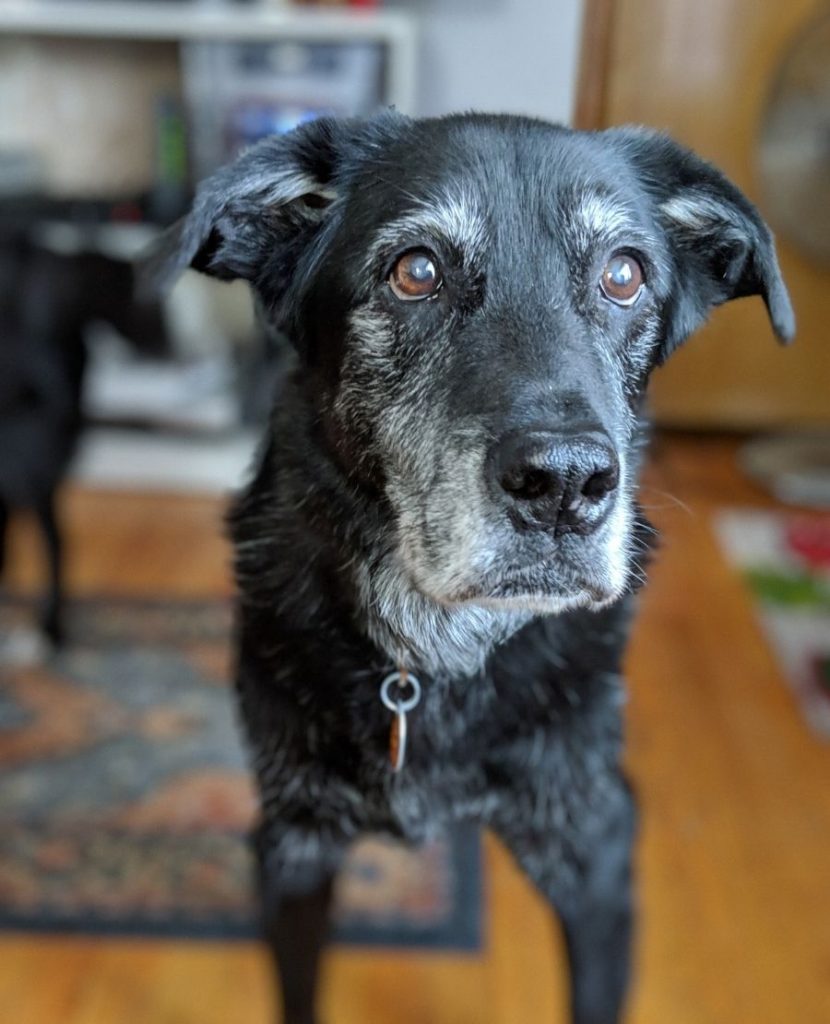Unfortunately, there is not enough awareness of senility in dogs.
We see older people behave in some kind of way and assume it is just one of the downsides of getting old when it goes even deeper than that.
Dementia is not a particular disease but a bunch of conditions that are identified by the way it ruins a minimum of two of the brain’s functions (memory and discernment).
Finding your dog always looking so confused and requiring more care to keep it safe may make you ask: can dogs get dementia?
Like humans, dogs can get dementia too, and it puts a mental and emotional strain on their overall well-being.
You must understand what dog dementia is to cater properly to your pooch’s needs when the senile symptoms show up.
Understanding Dementia in Dogs: Can Dogs Get Dementia?

Just like humans, when a dog ages, it starts to forget things. It becomes so aggressive to even its owner because it can’t remember a thing.
You might start getting worried about this and feel like your furry friend doesn’t love you anymore. This is not so. Dogs can have depressive nerve disorders that can screw up their sanities.
In dogs, this degenerative brain disorder is also known as Canine Cognitive Dysfunction (CCD). It is a mental condition in dogs that has effects quite peculiar to humans living with Alzheimer’s disease.
This cognitive dysfunction in dogs and dementia in humans share distinct similarities that many wonders if a cure found for dogs, will help treat the disease in their human companion.
According to Parkside Animal Hospital, 62% of senior dogs between the ages of 11 to 16 years show one or more signs of CCD or dementia. This percentage gets even higher as the dog grows older.
Dementia is an age-linked ailment. Every dog becomes vulnerable to it as they get older.
So, if your dog starts to go the wrong way during a walk or begins to forget who you are, or you notice any other behavioral changes that might mostly impact its memory, understanding, and awareness, then there is every likelihood that it’s beginning to have mental deterioration.
To guarantee it is not dementia but normal dog behavior, there are some signs to look out for.
If these signs start to present themselves, you can take that urgent trip to the vet.
Dog Dementia Symptoms: Senile Signs to Watch Out For

It is absolutely important to be able to recognize signs that tell you if your dog is starting to suffer a cognitive decline.
Not everyone is skilled in this aspect; that’s why this article is here to serve as a guide to detecting these signs on time. You’re welcome!
There are numerous ways to recognize dementia in canines. It ranges from mild to moderate to severe symptoms.
- Tension
- Reduced craving for food (anorexia)
- Aimless roaming/restlessness
- Disorientation and disarray
- Extreme grumpiness
- Failing to recollect habits and once learned training
- No longer responding to their name or familiar commands
- Lessened passion for playing
- Gazing blankly at walls or into nothingness
- Alterations in the sleep cycle
- Sluggish to learn new duties/responsibilities
All these are summed up in the DISHAAL acronym that is widely used to outline dementia signs in canines.
- D: Disorientation.
- I: Interaction changes.
- S: Sleep/wake cycle disruptions.
- H: House soiling.
- A: Activity changes.
- A: Anxiety.
- L: Learning and memory loss.
Medical Conditions Linked to Canine Cognitive Dysfunction

We all know this illness comes with age, as it’s often seen in a greater percentage of the senior dog population, but several things can trigger it, like other brain injuries and inborn factors.
The medical conditions that are associated with dog dementia include:
- Diabetes
- Cushing’s disorder
- High blood pressure
- Hearing loss
- Vision loss/impaired vision
- Urinary Tract Infection (UTI)
- Kidney disease
- Arthritis
- Skin disease
Causes of Dementia in Dogs
No specific cause for Dog Dementia has been found yet. Even with the progression in veterinary medicine, all we have is theories upon theories.
However, we certainly do know that dogs experience a mental decline as they grow older.
As dogs age, their brain cells start to die, which can lead to a drop in their mental health.
Aside from the age factor, some other medical conditions mentioned earlier put your animal at risk of developing dementia.
How is Dog Dementia Diagnosed?
You need to know that all the symptoms listed above don’t necessarily mean your dog suffers from this mental condition.
Your veterinarian is in the best position to give the final verdict based on your observation, so be more vigilant.
A dementia diagnosis is not a “Yes or No” kind of affair. Diagnosing dog dementia needs to be done professionally to detect other diseases that might be present.
The vet will need you to give a detailed history of your canine’s health, including when you started noticing the symptoms, the nature of it, and occurrences that could have possibly incited it.
Then, they’ll need to run some tests to detect if it’s, in fact, dementia.
Dog Dementia Treatment

Sadly, there is no known method of treating dementia in dogs, just like there’s no exact cure for this disorder in humans.
However, there are several ways to manage this condition and care for our furry friends.
When you suspect your dog is down with this disorder, you need to talk with your vet to select the best alternatives/treatment for your dog.
To manage this condition, you’d have to:
- Use drugs prescribed by the vet: Drugs like Ropesalazine used to treat Alzheimer’s disorder in humans have been tested to help manage dogs’ dementia. Selegiline, Antidepressants, and Anipryl are drugs that will relieve your dog of the pains associated with the disease, regulate the symptoms and manage the CCD.
- Change your dog’s diet: Antioxidants like Vitamins E and C, Selenium, L-carnitine, Flavonoids, Carotenoids, Alpha-lipoic acid, etc., can slow down and reverse the process of Cognitive decline in our furry friends.
- Go for regular checkups: Taking your dog to see the vet for a professional health checkup has so many advantages. Through a series of tests your vet will perform, signs that indicate the presence of Dementia will be detected on time, and the disorder will be corrected and eliminated, so it doesn’t become a problem in the long run.
- Supplements: Use life enrichment and nutritional supplements as specified by the vet.
- Regular exercise: Set aside time for exercising as it’s a wonderful way to help dogs with the disorder.
- Training: Be open to teaching your dog new skills to help with remembrance, comprehension, and judgment.
- Give your dog all the love in you: Your dog will need you in this critical time of its life, and though it might not be too easy for you, think of all the times it made you smile. If you’re not comfortable letting your dog “sleep” to ease all the pains, shower it with all the love in you.
How Do You Prevent Cognitive Decline in Dogs?
There is a saying that goes thus, “An ounce of prevention is better than cure.”
This simply means that it is of utmost importance to stop this disorder from taking a huge toll on your canine’s mental health before it advances to become a real problem in the future.
It is quite tasking to look for effective ways to prevent dementia in dogs since it doesn’t have a specific condition behind it.
Although, there are ways to ensure your dog is mentally and bodily fit as it can help prevent the cognitive decline in senior dogs to an extent.
According to studies, engaging your dogs in regular moderate physical activities and mentally stimulating them with interactive toys may help maintain the dog’s mental health.
Your older dogs might need to go for regular professional health checkups as they’re more susceptible to this illness.
It is, therefore, necessary to incorporate trips to the vet into your dog-owner relationship.
Bottom Line on Senility in Dogs
Unfortunately, senior dogs can get dementia. Some misinterpret this struggle that older dogs go through to be bad behavior, but it is wrong.
If only dogs spoke the language of man, we’d get a little idea of what they’re going through.
Dogs are starting to live longer, and albeit a good thing, it also has its disadvantage. With long life comes a high risk of developing dog dementia.
When you start to notice even the slightest sign of CCD in your furry friend, take action almost immediately by seeing a vet.
It is not easy to take care of a dog with cognitive dysfunction. It will take your time, energy, attention, and even money, but you won’t relent.
Our dogs served us in good health, and it’s only normal that we return the favor in their down moments.
You May Also Like:
What Toxins Can Cause Seizures In Dogs? Be Careful!
Featured Image: Pilar G Abadias / Getty Images







